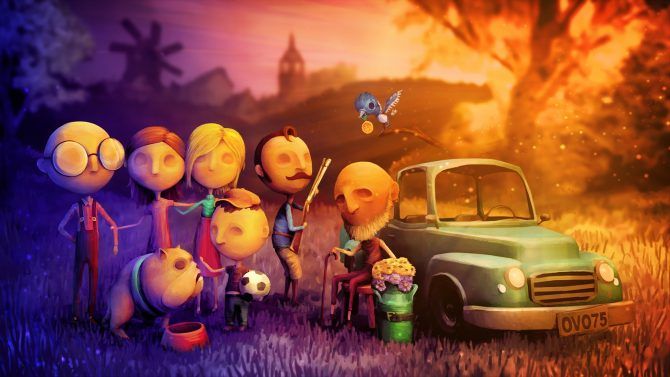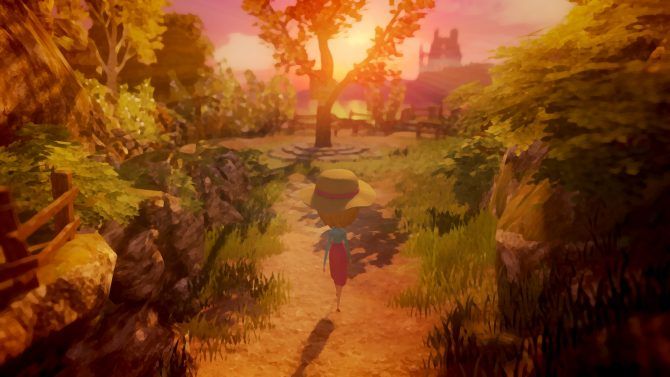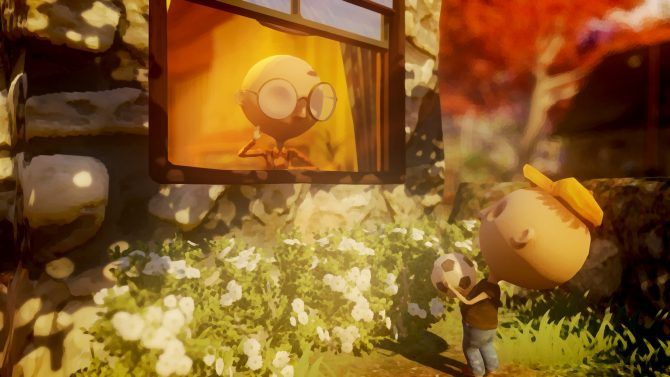Last Day of June will drastically resonate differently from player to player, as is common with personal stories that are so dependent on striking emotional chords to a tempestuous rhythm. It will move some people to tears. Others will be transported to a more raw and desolate place, best left forgotten. Some might be forlorn momentarily. And others will simply find an experience that elicits very little.
I always find it difficult to review experiences like this: experiences so dependent on personal variables. Yet, they are some of the reviews I cherish plunging into the most. How do I assess a game that could be one of the most powerful moments of the year for one person, and nugatory for another -- especially when the difference maker is perhaps not even the game itself, but the emotional baggage that one does or does not carry? The answer is "I don't know"; but that's why I like reviewing games like the Last Day of June, because I at least get to try to answer this question.
Last Day of June takes place in a beautiful painterly countryside that is equally transfixing and relaxing. The summery blur stills clouds your eyes, colors are vibrant, peaceful yet alive, and any feelings you had weighing you down or anxiously jolting you are pacified almost immediately. Last Day of June doesn't feel like it takes place in a virtual reality, it feels like it takes place within a beautiful, breathing summer painting.
[pullquote]"Last Day of June doesn't feel like it takes place in a virtual reality, it feels like it takes place within a beautiful, breathing summer painting."[/pullquote]
You plop into the shoes of Carl, a bald man whose head is wider than his elongated body, and whose glasses are adorably way too big for even his large round face. His design is reminiscent of character designs by Tim Burton, as is his wife June and the rest of the characters you'll meet on your journey.
After my mesmerization period with the game's art style subsided, one of the first things that sticks out among the beauteous scenes is that nobody has eyes, just indents where eyes should be. Nobody has mouths either. And with no mouth, nobody speaks intelligibly. The lack of comprehensible language is replaced by an expressive Sims-style speak that is just suggestive enough to get emotional points across, while also leaving a bit of interpretation up to the player. And this is fine; Last Day of June's minimalist approach to storytelling is not about what is said, it is about what is unsaid, and felt.
[pullquote]"Last Day of June's minimalist approach to storytelling is not about what is said, it is about what is unsaid, and felt."[/pullquote]
The unfinished look of each character -- the lack of mouth and eyes -- admittingly is rather uncanny at first, especially juxtaposed against the game's beautiful enviroments. The eyes especially were a bemusing absence: as they're arguably the most expressive and emotionally suggestive piece of the human body. But the game's ability to convey personal, complicated, and deep emotions was not hindered by this in the slightest. Because while the characters looked uncomfortably otherworldly initially, the lack of personalization serves as a clever tool to let the player project onto these archetypal characters and create a more individualized experience.
The opening scenes of the game make it apparent what Last Day of June is about: love and loss, and how the the two can simultaneously intertwine and be at odds with each other. You sit on a dock overviewing a sky dotingly brushed with golden rays of sunlight that beam down to the warm surface of a summer lake. June is audibly shivering and so solicitous Carl decides to trek up the hill to grab June's sweater, but not before he adorns her hair with a flower of his choosing.
Upon his return, the two sit. It's serene, beautiful, and the love perceptible. But the quaint date soon slams into a brewing storm. The intimacy dissipates as quickly as it starts raining. June and Carl race to the car to weather the storm. They drive off, away from the warm, picturesque scene into a cold, disordered reality: a foreshadowing of what is vs. what is to come.
[pullquote]"They drive off, away from the warm, picturesque scene into a cold, disordered reality: a foreshadowing of what is vs. what is to come."[/pullquote]
If the opening scenes of Last Day of June are about the simple beauty of love, most of the game is about the ugly face of loss, and the lengths one will go to run away from it. At one point, Carl wakes up in dark room. On the outside he looks the same, but on the inside it's evident he is defeated. June's chair next to him is empty. On the other side is another empty seat: a wheelchair. Carl is not only emotionally handicapped, he's physically. Pictures of his old life -- his life with June -- hang around the house, which feels like in a state of pause since however long ago June died. It's clear Carl has not accepted this new reality of his.
[pullquote]"If the opening scenes of Last Day of June are about the simple beauty of love, most of the game is about the ugly face of loss, and the lengths one will go to run away from it."[/pullquote]
It's from here where Last Day of June picks up and establishes the game's overhanging driving factor: what would you do to save the one you love? Carl would do anything and everything. Over and over again, even if it was hopeless. But Carl does find his glimmer of hope, his chance to rewind time to save June, in her old painting room, a room full of pain and suffering, and a room that Carl has locked away in the past.
Carl can relive the agonizing moments before June's death, but the catch is he has to do it from the perspectives of every other character who lives in their little community. Jumping from one character's memory to another has an unmistakable desperate feeling, but Carl quickly clings to the idea that if he can just change enough of the events of that day through these other characters, he might be able to modify the events of that day and wake up next to June, restored.
The beginning and end of Last Day of June is a holy trinity that merges the best of video games, movies, and art. However, the promise of the start of the game, and pay-off by the end of it, is dwindled by everything in between: by the game's core gameplay. Last Day of June is a borderline terrific piece of interactive art, but a fairly bland and prosaic video game. Which is fine in certain cases, but in the case of Last Day of June too much of its experience dabbles unimaginatively in the latter.
[pullquote]"Last Day of June is a borderline terrific piece of interactive art, but a fairly bland and prosaic video game."[/pullquote]
Last Day of June is very much a game of trials and tribulations. As you relive these moments you see a withering Carl heartbreakingly realize that there is nothing simple about rewinding time and changing history. Life often feels like a grand-scheme, while a single day is insignificant and uncomplicated comparatively. But it's not; a single moment, let along a single day, is unforeseeably complex. Thus it's a shame Last Day of June undermines this with an uninvolved gameplay loop.
Trying to save June isn't a rewarding puzzle to piece together, it's a linear, repetitive process that feels like it has little rhyme or reason to it. Because you spend such little time thinking and solving puzzles, much of the game is walking from one place to another and completing button prompts in uninspired fashion. You walk around, press X a few times, and complete the day. And then watch the same, unskippable cutscene that shows June dying in either one of a few slightly varied ways. You rinse-and-repeat these steps in ground-hog day fashion in what feels like way too many times.
You do this from four different character perspectives (levels). Often it is required that you rewind a level you already beat to skew it a certain way so you can progress. In a lot of ways it reminded me of a classic sliding-puzzle -- and I hate sliding puzzles with an unfathomably deep-rooted passion. There's never a light-bulb moment that characterize the best puzzle games; rather you can always see the solution from a mile out, you just have to figure out how to get to it through a twisting path that requires the game to unfold rather than for you to navigate.
Having to watch the same cutscene over and over again takes all the sting out of the emotional tail of this game: June's death. The first time I saw June die it was heart-rending. The 15th time I saw it: I just scrolled through Twitter while waiting for it to play out. Heartbreak turned to annoyance, and slowly but surely I found myself becoming desensitized to the game's emotional nebulous, which in turn lessened the eventual resolution. The only justification I can see for this design choice is to inflict the player with the same type of frustration Carl felt every time he realized his manipulation had not been enough. Whatever the reasoning was, it didn't work. Rather then serve as a catalyst to continue my efforts, the frustration brought my mind away from the experience to elsewhere.
[pullquote]"Heartbreak turned to annoyance, and slowly but surely I found myself becoming desensitized to the game's emotional nebulous, which in turn lessened the eventual resolution."[/pullquote]
There are some bright spots within this ground-hog day loop however, particularly the community of characters you meet and play as. There's a lone-child who has no one beyond a drooling dog to play with; June's childhood-long best friend who secretly loves Carl; a middle-aged man troubled by the task of living up to his father; and an old man waiting to die a second time years after the love of life passed away. There's a lot of pain in Last Day of June, and it's not exclusive to Carl. The worse part is it's also very relatable.
You can further flesh out these characters via collectible memories. Finding said memories is relatively a straight-forward process, but one I thoroughly enjoyed, and one that adds richness and much needed context to the game's world. There's a heartbreaking story to tell with each of these characters, one that developer Ovosonico brilliantly teases just enough for you to invest, but not enough to subtract from the ongoing struggles of Carl.
From start to finish the good parts and bad parts of Last Day of June are heightened or lessened by a wondrous score. And I would expect nothing less from award-winning, Grammy-nominated British composer Steven Wilson. Before working on Last Day of June, Wilson didn't know what modern video games even looked like. But his first stab at scoring surely doesn't convey that. Last Day of June is an emotional, atmospheric journey, with or without your eyes open.
Last Day of June is a personal and emotional journey that brings you to the most beautiful corners of love and the darkest and most painful corners of loss at the same time. It's a compelling journey, with relatable characters within a beautiful world, brought to life with a sensational score. But ultimately, it's uninspired, core ground-hog day gameplay loop hinders and undermines everything that has been built around it.







